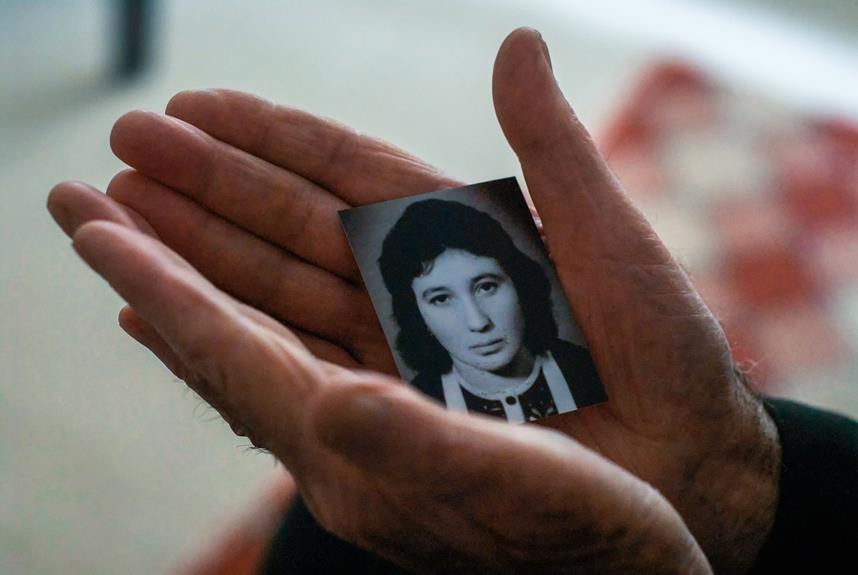What Is Woman Body Image and Building a Positive Relationship

In today's image-obsessed society, the concept of body image has become a prevalent concern for women. It is not merely a reflection of physical appearance, but also encompasses emotions, thoughts, and perceptions towards one's own body.
Building a positive relationship with our bodies is crucial for overall well-being and self-acceptance. This article explores the intricacies of woman body image, delves into the influence of media, and offers strategies to cultivate a healthy relationship with our bodies, promoting self-love and embracing diversity.
Key Takeaways
- Body image refers to how a person perceives and feels about their physical appearance, and it is influenced by societal standards, media portrayals, and personal experiences.
- Unrealistic beauty standards portrayed in media contribute to body dissatisfaction and can lead to feelings of inadequacy and low self-esteem.
- The body positivity movement and body acceptance campaigns aim to counteract these negative effects by promoting inclusivity and challenging beauty standards.
- Fostering self-acceptance and self-love, practicing self-compassion, and surrounding oneself with positive influences are key strategies for building a positive body image.
Understanding the Concept of Body Image
One must understand the concept of body image in order to develop a healthy and positive attitude towards oneself.
Understanding body positivity and the psychology of body image is crucial in serving others who may be struggling with their own body image.
Body image refers to how a person perceives and feels about their physical appearance, including their size, shape, and overall attractiveness.
This perception is influenced by societal standards, media portrayals, and personal experiences.
The psychology of body image delves into the emotional and cognitive processes that shape our beliefs and feelings about our bodies.
The Influence of Media on Women's Body Image
The media plays a significant role in shaping women's body image and contributing to body dissatisfaction. Through the portrayal of unrealistic beauty standards, such as thinness and flawless appearance, women are often left feeling inadequate and pressured to conform to these ideals.
This influence can have detrimental effects on women's mental health and self-esteem, highlighting the need for a more inclusive and body-positive media representation.
Media and Body Dissatisfaction
The portrayal of unrealistic beauty standards in the media contributes to body dissatisfaction among women. This constant exposure to unrealistic standards can lead to feelings of inadequacy, low self-esteem, and body dissatisfaction.
This has led to a growing body positivity movement and an increase in body acceptance campaigns. The body positivity movement seeks to counteract these negative effects by promoting inclusivity and celebrating all body shapes and sizes. Body acceptance campaigns strive to challenge beauty standards and encourage women to embrace their bodies as they are, fostering a more positive and empowering mindset.
These initiatives aim to challenge societal norms and promote self-love and acceptance of diverse body types. The media plays a significant role in shaping society's perception of beauty, often presenting an idealized image that is unattainable for most women.
Unrealistic Beauty Standards
Interestingly, the portrayal of unrealistic beauty standards in the media continues to influence women's body image. The constant bombardment of images showcasing unattainable expectations of thinness and flawless appearance can lead to feelings of inadequacy and dissatisfaction with one's own body.
This negative impact on women's self-esteem has prompted the rise of the body positivity campaign, which aims to challenge and redefine societal beauty norms. The campaign encourages women to embrace their bodies, regardless of shape, size, or imperfections. It promotes self-acceptance, self-love, and the celebration of diversity in beauty.
Factors That Contribute to Negative Body Image
There are several factors that contribute to negative body image, including:
- The role of media in portraying unrealistic beauty standards
- The influence of societal expectations on physical appearance
- The impact of comparing oneself to others
These factors can lead individuals to develop a distorted perception of their bodies and contribute to feelings of dissatisfaction and low self-esteem.
Understanding and addressing these factors is crucial in building a positive body image and promoting mental well-being.
Media's Role in Body Image
Media perpetuates unrealistic beauty standards, leading to negative body image among individuals. In today's society, the media plays a significant role in shaping our perception of beauty. From fashion magazines to social media influencers, we are constantly bombarded with images of perfect bodies and flawless faces. This constant exposure to unrealistic beauty ideals can have a detrimental effect on individuals, particularly young women, who may feel pressured to conform to these standards. It is important to address this issue and promote body positivity and self-esteem.
Here are four ways we can combat the negative impact of media on body image:
- Encourage diversity: Promote the idea that beauty comes in all shapes, sizes, and colors. Embrace and celebrate different body types to challenge the narrow definition of beauty perpetuated by the media.
- Educate on media literacy: Teach individuals to critically analyze media messages and recognize the use of Photoshop and other editing techniques. By understanding the tricks used to create unrealistic beauty standards, individuals can develop a more realistic perception of beauty.
- Foster positive self-talk: Encourage individuals to practice self-acceptance and promote positive self-talk. Remind them that their worth is not determined by their appearance, but by their character and accomplishments.
- Support body-positive role models: Highlight individuals who embrace their bodies and promote body positivity. By showcasing diverse role models, we can inspire others to feel confident in their own skin and challenge the unrealistic beauty standards perpetuated by the media.
Societal Beauty Standards
The influence of societal beauty standards on individuals' perception of their bodies is a topic that warrants a thorough examination. In a society that often promotes narrow and unrealistic ideals of beauty, many individuals are left feeling inadequate and self-conscious about their own bodies. This can have a detrimental impact on their mental and emotional well-being.
Body positivity and body acceptance are crucial concepts in countering these damaging societal standards. By promoting the idea that all bodies are inherently valuable and deserving of love and respect, individuals can begin to develop a healthier relationship with their own bodies.
However, the impact of peer comparison cannot be overlooked. Comparing oneself to others, especially in terms of physical appearance, can further perpetuate negative body image and undermine the progress made towards body acceptance. It is important to address this aspect in order to fully understand the complexities of body image and to develop effective strategies for promoting a positive body image.
Impact of Peer Comparison
Several studies have highlighted the detrimental impact of peer comparison on individuals' body image, and understanding these factors is crucial in developing effective strategies for promoting a positive body image. Peer pressure and social comparison can significantly influence how individuals perceive their own bodies and can lead to negative self-esteem and body dissatisfaction.
To address this issue and promote a positive body image, it is important to consider the following:
- Encourage self-acceptance: Promote the idea that everyone is unique and beautiful in their own way, emphasizing the importance of self-acceptance rather than conforming to societal ideals.
- Foster a supportive environment: Create a safe space where individuals can freely express themselves without fear of judgment, allowing them to develop a positive body image without the pressure of comparison.
- Educate on media literacy: Teach individuals to critically analyze media messages and understand that the images they see are often edited and unrealistic, helping them to develop a more realistic perception of beauty.
- Promote self-care: Encourage individuals to engage in activities that promote self-care and well-being, such as exercise, healthy eating, and practicing self-love and self-compassion.
The Importance of Self-Acceptance and Self-Love
Significantly, fostering self-acceptance and self-love is imperative for individuals to cultivate a positive body image and build a healthy relationship with themselves.
In a society that often perpetuates unrealistic beauty standards, it is crucial for individuals to develop self-compassion and embrace body neutrality. Self-compassion involves treating oneself with kindness and understanding, acknowledging that everyone has strengths and weaknesses.
By practicing self-compassion, individuals can learn to appreciate their bodies for what they can do rather than focusing on how they look.
Body neutrality, on the other hand, emphasizes accepting one's body without assigning a value or judgment to it. This approach encourages individuals to focus on what their bodies can accomplish rather than how they measure up to societal ideals.
Ultimately, promoting self-acceptance and self-love is essential for individuals to develop a positive body image and cultivate a healthy relationship with themselves.
Building a Positive Body Image Through Self-Care
Engaging in regular self-care practices can significantly contribute to building a positive body image. When we prioritize taking care of ourselves, both physically and mentally, we create a foundation of self-love and acceptance. Here are four self-esteem boosting activities that can help cultivate a positive body image:
- Practice self-compassion: Treat yourself with kindness and understanding. Acknowledge your worth and embrace your unique qualities.
- Surround yourself with body positive social media: Follow accounts that promote body diversity, self-acceptance, and body positivity. Seeing diverse bodies can help challenge societal beauty standards and foster self-acceptance.
- Engage in physical activities you enjoy: Find joy in movement and engage in activities that make you feel good. Focus on the pleasure and strength that comes from being active, rather than solely on achieving a certain appearance.
- Practice positive self-talk: Challenge negative thoughts and replace them with positive affirmations. Remind yourself of your worth, strengths, and accomplishments.
Challenging Societal Beauty Standards and Embracing Diversity
One effective way to challenge societal beauty standards and embrace diversity is by promoting body positivity and self-acceptance through various means.
In today's society, there is an increasing emphasis on embracing uniqueness and celebrating diversity. The body positivity movement has gained momentum as a powerful force in challenging narrow beauty standards and promoting self-love and acceptance.
By encouraging individuals to embrace their bodies, regardless of shape, size, or appearance, we can create a more inclusive and accepting society.
Promoting body positivity involves fostering a culture that celebrates all bodies and rejects unrealistic beauty ideals. This can be achieved through educational campaigns, social media activism, and creating safe spaces for individuals to share their stories and experiences.
By challenging societal norms and promoting body positivity, we can empower individuals to embrace their uniqueness and cultivate a positive self-image.
Together, we can create a world where everyone feels valued and accepted, regardless of how they look.
Strategies for Cultivating a Healthy Relationship With Your Body
Developing a healthy relationship with your body requires implementing effective strategies that prioritize self-care and self-acceptance. To build self-confidence and embrace body diversity, consider the following strategies:
- Practice self-care rituals: Engage in activities that promote physical and mental well-being, such as exercise, meditation, and getting enough rest. Taking care of your body can enhance self-confidence and promote a positive body image.
- Challenge negative thoughts: Recognize and challenge negative self-talk or societal beauty standards that may contribute to body dissatisfaction. Replace these thoughts with positive affirmations and focus on your unique qualities and strengths.
- Surround yourself with positive influences: Surround yourself with people who support body positivity and embrace body diversity. Engage in communities or online platforms that promote self-acceptance and celebrate diverse body types.
- Seek professional help if needed: If you struggle with body image issues, consider seeking support from a therapist or counselor. They can provide guidance and help you develop coping strategies to improve your relationship with your body.
Frequently Asked Questions
How Does Society's Beauty Standards Affect Women's Body Image?
Society's beauty standards greatly impact women's body image, as media influence and cultural expectations play a significant role. These standards often lead to negative self-perception and a constant pursuit of an unattainable ideal, affecting women's mental and emotional well-being.
What Are Some Common Factors That Contribute to Negative Body Image in Women?
Various factors contribute to negative body image in women. Media influence, with its unrealistic beauty standards, can lead to constant social comparison. This can create feelings of inadequacy, low self-esteem, and a negative relationship with one's own body.
Can Self-Acceptance and Self-Love Really Help Improve Body Image?
Self-acceptance and self-love play crucial roles in improving body image. By embracing one's uniqueness and promoting body positivity, individuals can develop a healthier relationship with their bodies, leading to increased self-confidence and overall well-being.
What Are Some Strategies for Building a Positive Body Image Through Self-Care?
In order to build a positive body image through self-care, individuals can engage in self-esteem techniques such as mindfulness, self-compassion, and gratitude. These practices align with the body positivity movement and promote self-acceptance and self-love.
How Can Women Challenge Societal Beauty Standards and Embrace Diversity in Order to Improve Their Body Image?
Promoting body positivity entails challenging societal beauty standards and embracing diversity. By encouraging women to embrace their individuality and uniqueness, they can improve their body image and cultivate a positive relationship with themselves.








